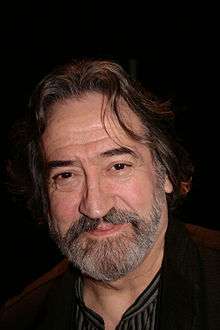Jordi Savall
| Jordi Savall | |
|---|---|
 Jordi Savall in 2007 | |
| Background information | |
| Birth name | Jordi Savall i Bernadet |
| Born |
August 1, 1941 Igualada, Catalonia, Spain |
| Genres | Classical, western early music |
| Occupation(s) | Gambist |
| Instruments | Viola da gamba, viola da braccio |
| Website | http://www.alia-vox.com/ |
Jordi Savall i Bernadet (Catalan: [ˈʒɔrði səˈβaʎ i βərnəˈðɛt]; born August 1, 1941) is a Catalan conductor, viol player, and composer. He has been one of the major figures in the field of Western early music since the 1970s, largely responsible for popularizing the viol family of instruments (notably the viola da gamba) in contemporary performance and recording. His characteristic repertoire features medieval, Renaissance and Baroque music, although he has occasionally ventured into the Classical and even the Romantic periods.
Musical education
His musical training started at age six in the school choir of his native town (1947–55). After graduating from the Barcelona Conservatory of Music (where he studied from 1959 to 1965) he specialized in early music, collaborating with Ars Musicae de Barcelona under Enric Gispert, studying with August Wenzinger at the Schola Cantorum Basiliensis in Basel, Switzerland (1968–70) and eventually succeeding Wenzinger in 1974 as professor of viola da gamba at the Schola Cantorum Basiliensis.
Ensembles
In 1974 he formed the ensemble Hespèrion XX (known since 2000 as Hespèrion XXI), together with soprano Montserrat Figueras (his wife, who died in 2011), Lorenzo Alpert and Hopkinson Smith. Hespèrion XX favored a style of interpretation characterized simultaneously by great musical vitality and maximum historical accuracy.
In 1987 he returned to Barcelona to found La Capella Reial de Catalunya, a vocal ensemble devoted to pre-eighteenth-century music.
In 1989 he founded Le Concert des Nations, an orchestra generally emphasizing Baroque period, but sometimes also Classical and even Romantic music (e.g., Sinfonía [por] Grande Orquesta by Juan Crisóstomo de Arriaga) (1806-1826).
More recently, Savall has performed with family members. The family ensemble has included his late wife Montserrat Figueras and their two children, Arianna and Ferran. Arianna Savall plays the harp and sings, like her mother. Ferran Savall plays the theorbo (bass lute) and sings, not only with his family but also in Barcelona jazz clubs.[1]
Recordings
Savall's discography includes more than 100 recordings. Originally recording with EMI Classics, and then from 1975 on Michel Bernstein's Astrée label, since 1998 he has recorded on his own label, Alia Vox.[2]
Honours and awards
- 2000 - Premi d'Honor Lluís Carulla for service to Catalan culture or for scientific, cultural or civic works in the Catalan language
- 2006 - Honorary doctorate from the University of Barcelona
- 2008 - Appointed European Union ambassador for intercultural dialogue
- 2008 - Savall and his wife, Montserrat Figueras, were named "Artists for Peace" by UNESCO.[3]
- 2009 - Handel Music Prize from the city of Halle, Germany
- 2009 - National Music Prize from the National Council of Music and Arts of Catalonia
- 2010 - Praetorius Musikpreis Niedersachsen
- 2010 - MIDEM Classical Award for his album "Jerusalem – la ville des deux Paix: La paix céleste et la paix terrestre"[4]
- 2011 - Grammy Award for Best Small Ensemble Performance for Dinastia Borja. Església i poder al Renaixement
- 2012 - Léonie Sonning Music Prize[5]
- 2013 - French Légion d'honneur[6]
- 2013 - Honorary doctorate from the University of Basel
- 2014 - Gold Medal of the Generalitat of Catalonia
- In 2014 he refused the Premio Nacional de Música awarded by the Spanish government, in protest at the government's artistic policies, accusing them of "grave incompetence" and "dramatic disinterest".[7]
- 2016 - Honorary doctorate from Utrecht University
Filmography
Savall adapted and performed music for the 1991 Alain Corneau film Tous les matins du monde about composers Sainte-Colombe and Marin Marais. His work on this film earned him a César award from the French film industry in 1992. The soundtrack has sold more than a million copies worldwide.
He has composed music for the following films:
- (1991) Tous les matins du monde (All the Mornings of the World) by Alain Corneau
- (1993) The Bird of Happiness (El pajaro de la felicidad) by Pilar Miró
- (1994) Joan the Maiden (Part 1: The Battles; Part 2: The Prisons) by Jacques Rivette
- (1997) Long Twilight (Hosszú alkony) by Attila Janisch
- (1997) Marquise by Véra Belmont
- (1998) Secret Defense (Top Secret) by Jacques Rivette
In popular culture
- Savall and his wife are characters in a 2009 work of fiction, Sır (Secret), by Turkish writer Enis Batur. The plot includes a surprise birthday party for Jordi Savall.
References
- ↑ Alex Ross, "The King of Spain: Jordi Savall at the Metropolitan Museum", The New Yorker (May 2, 2005).
- ↑ Alia-Vox, "Who We Are" http://alia-vox.com/aliavox.php#rao, accessed 16 December 2008.
- ↑ "Montserrat Figueras and Jordi Savall are named 'Artists for Peace'", 18 June 2008,
- ↑ aliavox.com
- ↑ Léonie Sonning Music Foundation official website
- ↑ Jordi Savall rep les insígnies de Chevalier de la Légion d'Honneur, prestigiosa distinció que atorga el govern francès
- ↑ Limelight, January 2015. Retrieved 19 June 2016
External links
| Wikimedia Commons has media related to Jordi Savall. |
- Alia-vox.com, Jordi Savall's official website.
- Complete discography at Medieval.org
- The private website Classic @ la carte is devoted primarily to Jordi Savall's works.
- Misteria Paschalia Festival
- Zachary Woolfe, Interview, "Jordi Savall's Never-ending Repertory", New York Times, 27 March 2015. Retrieved 31 March 2015
- at festivalenescu.ro
- at www.gramophone.co.uk